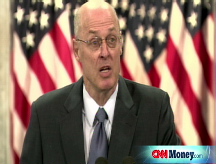Small biz: Here's the help we really need
New FDIC insurance limits reassure business owners, but fail to address what's really needed on Main Street.
NEW YORK (CNNMoney.com) -- President Bush's announcement Tuesday that the Federal Deposit Insurance Corp. will temporarily do away with its insurance caps and cover all deposits in non-interest bearing accounts was a measure aimed straight at Main Street. But critics say the step doesn't address the most critical problem threatening small businesses: slow sales and a sluggish credit market.
The FDIC's move, part of a broad plan to pump billions into the nation's banks and restore confidence in the financial markets, aims to reassure small business owners, who often keep large sums stashed in accounts to fund daily operating expenses and payroll or cover large captial expenditures.
"By insuring every dollar in these accounts, we will give small business owners peace of mind ... and bring greater stability to the banking system," Bush said.
But while the move pleases the National Small Business Association, it recently found that members were more concerned about day-to-day problems, such as cash flow and credit, than FDIC insurance limits.
In a September poll of NSBA members, 68% of respondents said the FDIC's standard $100,000 insurance limit wouldn't be enough to fully protect their business accounts. But when the NSBA followed up with business owners to evaluate the problem's seriousness, it found that FDIC insurance limits weren't a top-priority concern.
Toward that end, the NSBA is pushing for a repeal of the fees the Small Business Administration charges lenders to participate in its flagship 7(a) and 504 loan programs.
"The fees are at such high level it's shutting banks and borrowers out of the program entirely, especially those rural, community banks," said NSBA vice president of public affairs Molly Brogan.
The number of 7(a) loans given in the 2008 fiscal year dropped 30% from 2007, the SBA recently reported. The program offers banks a guarantee on as much as 85% of the money they lend to qualifying small companies, but it carries fees of up to 3.5% of the loan amount, a cost that often totals thousands of dollars. The fees have crept up in recent years, which critics say has directly cut into lending.
Several politicians have called for the temporary repeal of those fees. Senator John Kerry (D-Mass.), who chairs the U.S. Senate Committee on Small Business and Entrepreneurship, introduced legislation last month to suspend the fees for the next year, and presidential candidate Sen. Barack Obama called last week for the SBA to both suspend fees for its guarantees and directly back more loans through its disaster-lending program.
"If we don't act, we'll be looking at scaled back operations, shuttered shops, and laid-off workers," Obama warned last week at a rally in Chillicothe, Ohio.
Respondents on CNNMoney.com's TalkBack blog largely agreed with Obama's call for urgent action.
"I have a small business that up until last year employed two full time workers. I now have no employees, and that is because of the current economic conditions," wrote David Gilmore of Bow, Wash. "Offering easier loans to small businesses would address both of the problems I have, weak sales and no operating capital."
"As an SBA lender, I have to say that this is a good start," another commenter wrote. "The cost of an SBA loan has steadily increased over the past eight years of the Bush administration. At the same time, the SBA has been cut in half, which has increased inefficiencies to the small business applicant."
While the FDIC insurance increase will offer greater peace of mind for businesses with six-figure sums stashed in the bank, it's a cold comfort to those who already lost out in bank failures. Applied Cognetics, a four-year-old software company in New York City, had around $800,000 in its accounts at NetBank, which was seized by the FDIC last year. The company received some of its cash back as the FDIC liquidated NetBank's assets, but it's still short about $150,000.
When Applied Cognetics founder Chris Coulthrust heard Tuesday of the FDIC's unlimited-insurance guarantee, he grumbled about the government "injecting money into banks who won't lend it, instead of giving people and business their own money back so they will spend it."
Consultant Fran Quittel, a California small business owner who lost money in IndyMac's failure, is also frustrated to see the government taking action only after the proverbial horses have fled the barn. She sees bailout after bailout piling up, but none that will restore her vanished funds.
"The FDIC has made up its strategy as it went along," she said. "I think it is overdue, and it is entirely unfair to punish the small business owners and other depositors who lost money at IndyMac. Is IndyMac the only institution where accounts are not 'dollar good,' and every other takeover is? I'm still not sure we know the eventual size of this bailout!" ![]()
Life after your bank fails
Obama's small biz rescue plan: The details
Credit crunch freezes hiring, expansion
-
The Cheesecake Factory created smaller portions to survive the downturn. Play
-
A breeder of award-winning marijuana seeds is following the money and heading to the U.S. More
-
Most small businesses die within five years, but Amish businesses have a survival rate north of 90%. More
-
The 10 most popular franchise brands over the past decade -- and their failure rates. More
-
These firms are the last left in America making iconic products now in their twilight. More












